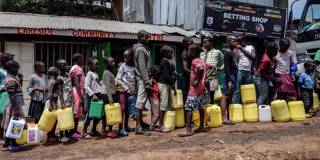In 34 of Sub-Saharan Africa’s 45 countries, annual per capita health spending is below $200, and measures like lockdowns, stay-at-home orders, and even frequent handwashing to combat COVID-19 are nearly impossible to implement. This simple fact underscores the urgent need for the Global Health Pledging Conference on May 4.
ADDIS ABABA – The world will not be free of the COVID-19 pandemic until all countries are free of the coronavirus that causes it. This simple fact underscores the urgent need for the Global Health Pledging Conference to be held on May 4. Only by acting now to support developing countries’ ability to combat the disease can the world avoid a second wave of the virus this autumn.
African Union leaders welcome the offers that are now coming in of test kits, ventilators, and personal protective equipment (PPE) from the developed world. But if we are to turn the tide against COVID-19, the world’s richest countries must hear and respond to the developing world’s pleas for a comprehensive strategy to overcome the dual public-health and economic crisis we face.
Up to now, there has been a huge disconnect between the rhetoric of rich-country leaders – that this is an existential, once-in-a-century global crisis – and the support for the world’s poor and developing countries than they seem willing to contemplate. Indeed, until last week, African countries were spending more on debt payments than on health care.

ADDIS ABABA – The world will not be free of the COVID-19 pandemic until all countries are free of the coronavirus that causes it. This simple fact underscores the urgent need for the Global Health Pledging Conference to be held on May 4. Only by acting now to support developing countries’ ability to combat the disease can the world avoid a second wave of the virus this autumn.
African Union leaders welcome the offers that are now coming in of test kits, ventilators, and personal protective equipment (PPE) from the developed world. But if we are to turn the tide against COVID-19, the world’s richest countries must hear and respond to the developing world’s pleas for a comprehensive strategy to overcome the dual public-health and economic crisis we face.
Up to now, there has been a huge disconnect between the rhetoric of rich-country leaders – that this is an existential, once-in-a-century global crisis – and the support for the world’s poor and developing countries than they seem willing to contemplate. Indeed, until last week, African countries were spending more on debt payments than on health care.